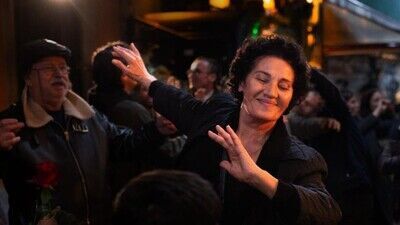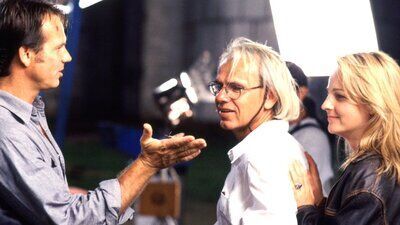A cool and collected Shula (Susan Chardy) drives into the opening scene dressed like Missy Elliott in “The Rain” music video. When she comes to a sudden stop, she sees a body lying in the street. It belongs to her Uncle Fred. When she concludes that Uncle Fred is dead, Shula isn’t overwhelmed by grief. She’s detached. Why isn’t she crying? Is she in shock? When her wild cousin Nsana (Elizabeth Chisela) appears, drunk and brandishing a handle of liquor, the tone becomes odder: Nsana simply laughs. And during the early going of the film, we’re left laughing too. Even though the elders want to hold a big, ceremonial funeral for Uncle Fred, it’s clear he was not well liked. The reason behind the distaste this family’s young women feel toward him when revealed, causes a bleak shadow to creep over until every corner is hauntingly consumed.
This is a ghostly film, and apparitions come in many forms: they arise in Shula’s dreams, which arrive with sporadic fury, about a kids’ program concerning the Guinea fowl that aired when she was child; they are heard in the mournful wailing her aunts crow throughout; they take shape in repressed memories and in the trauma that binds Shula and her cousins together; they happen when Uncle Fred’s wife is unnecessarily blamed for his death. Chardy and Chisela are a forceful team, working behind the emotional masks they’ve put over their respective characters to elicit an overwhelming sense of heartache. The film is also a showcase for Nyoni: delicate editing, informative compositions, and a formidable hold on tone make “On Becoming a Guinea Fowl” a giant leap forward for the filmmaker–one you expect to lead to many more triumphs.

“The Village Next to Paradise” begins on a jarring note: A news program reporting on drone airstrikes in Somalia appears to foretell a war-torn narrative infused with trauma, death, and any number of other triggers. The writer/director Mo Harawe, of course, knows what audiences expect from an African film, initially playing into such tropes with that opening tease before suddenly shifting to something quieter and more personal. Because “The Village Next to Paradise” is actually a family drama, one where Mamargade (Ahmed Ali Farah), a grumpy father, and his sister Araweelo (Anab Ahmed Ibrahim), raise the bright, young Cigaal (Ahmed Mohamud Saleban) in a tiny village.







Leave feedback about this